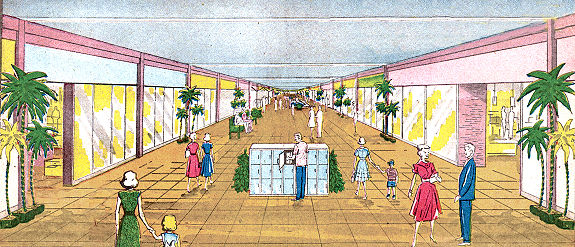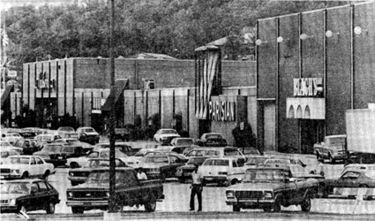Eastwood Mall: Difference between revisions
No edit summary |
No edit summary |
||
| Line 1: | Line 1: | ||
[[Image:Eastwood Mall logo.jpg|right|275px]] | [[Image:Eastwood Mall logo.jpg|right|275px]] | ||
'''Eastwood Mall''' was one of the earliest American shopping malls and the first enclosed mall in the Southeast. | '''Eastwood Mall''' was one of the earliest American shopping malls and the first enclosed mall in the Southeast. It opened in August [[1960]] at the intersection of [[Crestwood Boulevard]] ([[U.S. Highway 78]]), [[Montevallo Road]], [[Montclair Road]] and [[Oporto-Madrid Boulevard South|Oporto Road]] in the [[Eastwood]] section of [[Birmingham]]. It was developed by [[Newman Waters, Sr]], owner of the [[Waters Theater Company]], adjacent to his [[Starlite Drive-In]]. | ||
Eastwood Mall | ==Opening== | ||
[[Image:Eastwood Mall 1960 rendering.jpg|center|thumb|575px|Exterior rendering of Eastwood Mall in 1960, with Eastwood Lanes on right]] | |||
[[Image:Eastwood Mall interior rendering 1960.jpg|center|thumb|575px|1960 interior rendering of Eastwood Mall]] | |||
Eastwood Mall opened its doors at 10:00 AM on [[August 25]], [[1960]], with 43 stores. Its initial anchor tenants included [[J. C. Penney]], three supermarkets and a five-and-dime. The 48-lane [[Eastwood Lanes]] bowling center was built on an outparcel. Early advertisements for the mall boasted of its "Air Conditioned Sidewalks" and that it was "The Merchandise City of the Future". | |||
===Original tenants=== | |||
{| border="0" width="575" | |||
|- | |||
| valign="top" | | |||
* [[Aladdin Cleaners]] | |||
* [[Beauty Unlimited]] | |||
* [[Bell Brothers Shoes]] | |||
* [[City Federal Savings & Loan]] | |||
* [[Colonial Stores]] | |||
* [[Duane's Shoes]] | |||
* [[Eastwood Barber Shop]] | |||
* [[Exchange-Security Bank]] | |||
* [[Friend Sisters]] | |||
* [[Gordon's Quality Jewelers]] | |||
* [[Happy House Shops]] | |||
* [[Jones-Lawless]] | |||
* [[Kinney Shoes]] | |||
* [[S. S. Kresge Co.]] | |||
* [[Kroger]] | |||
* [[Lace & Fabric Mart]] | |||
* [[LaGrove Seed and Pet Shop]] | |||
* [[Lerner Shops]] | |||
| valign="top" | | |||
* [[Liggett Drug]] | |||
* [[Mall Cafe]] | |||
* [[Kiddieland (Eastwood Mall)|Kiddieland]] | |||
* [[Mall Gift Cards]] | |||
* [[Mall Record Shop and Appliance Center]] | |||
* [[Mazer's for Modern]] | |||
* [[Michael's Restaurant]] | |||
* [[J. J. Newberry]] | |||
* [[Olan Mills Studio]] | |||
* [[J. C. Penney Co.]] | |||
* [[Riddle's]] | |||
* [[ABC Store]] | |||
* [[Top Value Redemption Store]] | |||
* [[24-Hour Coin Laundry]] | |||
* [[Wendy's Sportswear]] | |||
* [[Western Auto Supply]] | |||
* [[The Gold Bow]] | |||
|} | |||
==Later developments== | |||
Anchors that have been connected to the center over time include [[Parisian]], [[Pizitz]] (later known as McRae's), Yielding's and Service Merchandise. | |||
For quite some time, the mall was unique in that it had two cafeterias under the same name and management, one at each end of the mall; [[Barber Dairies]] was the original owner, who later sold out to [[Britling]] Cafeterias, who themselves sold one location to [[Pioneer Cafeteria]] and closed the other. Two other long-time restaurants at the Mall were The Holland House located across from Kresge's and Pasquales located adjacent to Winn Dixie down by the Mall Theatre. Above the west end of the mall was office space, rented out for several years to a division of [[Rust Engineering]]. | For quite some time, the mall was unique in that it had two cafeterias under the same name and management, one at each end of the mall; [[Barber Dairies]] was the original owner, who later sold out to [[Britling]] Cafeterias, who themselves sold one location to [[Pioneer Cafeteria]] and closed the other. Two other long-time restaurants at the Mall were The Holland House located across from Kresge's and Pasquales located adjacent to Winn Dixie down by the Mall Theatre. Above the west end of the mall was office space, rented out for several years to a division of [[Rust Engineering]]. | ||
An [[Aeromarine]] boat dealership, and a small amusement park with miniature golf called [[Funtown]] were located across the parking lot from the west end of the mall. A go-cart track was located in the parking lot on the east side of the Mall. It was demolished as part of the 1966 expansion. | |||
A movie theater opened on Christmas Day [[1964]] and was equipped to show Cinerama movies such as ''2001: A Space Odyssey'' and ''Ice Station Zebra''. The Mall Theater was the site of the premiere of the [[1976]] film ''[[Stay Hungry]],'' which was set and filmed in Birmingham. Then unknown actor Arnold Schwarznegger attended the premiere. | A movie theater opened on Christmas Day [[1964]] and was equipped to show Cinerama movies such as ''2001: A Space Odyssey'' and ''Ice Station Zebra''. The Mall Theater was the site of the premiere of the [[1976]] film ''[[Stay Hungry]],'' which was set and filmed in Birmingham. Then unknown actor Arnold Schwarznegger attended the premiere. | ||
| Line 15: | Line 63: | ||
In [[1967]], Newman Waters sold the property to the Alabama Farm Bureau (today known as ALFA), which owned the property until the mid 1980s. In [[1989]], Eastwood Mall recieved a facelift, adding a food court with a large glass skylight and a wall of video screens. [[Books-A-Million]] came to the mall and the Parisian store was enlarged. The cinema, however, closed. | In [[1967]], Newman Waters sold the property to the Alabama Farm Bureau (today known as ALFA), which owned the property until the mid 1980s. In [[1989]], Eastwood Mall recieved a facelift, adding a food court with a large glass skylight and a wall of video screens. [[Books-A-Million]] came to the mall and the Parisian store was enlarged. The cinema, however, closed. | ||
Eastwood Mall was once one of the leading malls in Birmingham, remaining enormously successful for 30 years and continuing to hold its own in the 1990s. No longer able to compete with larger malls, and facing decline in the [[Irondale]] area plus the bankuptcy of Service Merchandise, the mall began to fade after 2000 and was finally closed in 2004, with the remaining anchor, Parisian closing a year later. | Eastwood Mall was once one of the leading malls in Birmingham, remaining enormously successful for 30 years and continuing to hold its own in the 1990s. | ||
==Decline and demolition== | |||
No longer able to compete with larger malls, and facing decline in the [[Irondale]] area plus the bankuptcy of Service Merchandise, the mall began to fade after 2000 and was finally closed in 2004, with the remaining anchor, Parisian closing a year later. | |||
Wal-Mart bought the property from Lehman Brothers (the last owner of Eastwood Mall), and built a Wal-Mart Supercenter on the site as part of the [[Eastwood Village]] shopping center constructed by [[MAP Development]]. | Wal-Mart bought the property from Lehman Brothers (the last owner of Eastwood Mall), and built a Wal-Mart Supercenter on the site as part of the [[Eastwood Village]] shopping center constructed by [[MAP Development]]. | ||
Revision as of 19:46, 5 August 2010
Eastwood Mall was one of the earliest American shopping malls and the first enclosed mall in the Southeast. It opened in August 1960 at the intersection of Crestwood Boulevard (U.S. Highway 78), Montevallo Road, Montclair Road and Oporto Road in the Eastwood section of Birmingham. It was developed by Newman Waters, Sr, owner of the Waters Theater Company, adjacent to his Starlite Drive-In.
Opening
Eastwood Mall opened its doors at 10:00 AM on August 25, 1960, with 43 stores. Its initial anchor tenants included J. C. Penney, three supermarkets and a five-and-dime. The 48-lane Eastwood Lanes bowling center was built on an outparcel. Early advertisements for the mall boasted of its "Air Conditioned Sidewalks" and that it was "The Merchandise City of the Future".
Original tenants
Later developments
Anchors that have been connected to the center over time include Parisian, Pizitz (later known as McRae's), Yielding's and Service Merchandise.
For quite some time, the mall was unique in that it had two cafeterias under the same name and management, one at each end of the mall; Barber Dairies was the original owner, who later sold out to Britling Cafeterias, who themselves sold one location to Pioneer Cafeteria and closed the other. Two other long-time restaurants at the Mall were The Holland House located across from Kresge's and Pasquales located adjacent to Winn Dixie down by the Mall Theatre. Above the west end of the mall was office space, rented out for several years to a division of Rust Engineering.
An Aeromarine boat dealership, and a small amusement park with miniature golf called Funtown were located across the parking lot from the west end of the mall. A go-cart track was located in the parking lot on the east side of the Mall. It was demolished as part of the 1966 expansion.
A movie theater opened on Christmas Day 1964 and was equipped to show Cinerama movies such as 2001: A Space Odyssey and Ice Station Zebra. The Mall Theater was the site of the premiere of the 1976 film Stay Hungry, which was set and filmed in Birmingham. Then unknown actor Arnold Schwarznegger attended the premiere.
At the time of its 1966 expansion to 70 stores, Eastwood Mall was believed to be the largest enclosed mall in the Deep South. Parisian built a new 35,000 square-foot anchor store at the mall in 1969, it's fourth branch to open in six years. Architect Brandon Crawford designed the store with a low-slung modern appearance.
In 1967, Newman Waters sold the property to the Alabama Farm Bureau (today known as ALFA), which owned the property until the mid 1980s. In 1989, Eastwood Mall recieved a facelift, adding a food court with a large glass skylight and a wall of video screens. Books-A-Million came to the mall and the Parisian store was enlarged. The cinema, however, closed.
Eastwood Mall was once one of the leading malls in Birmingham, remaining enormously successful for 30 years and continuing to hold its own in the 1990s.
Decline and demolition
No longer able to compete with larger malls, and facing decline in the Irondale area plus the bankuptcy of Service Merchandise, the mall began to fade after 2000 and was finally closed in 2004, with the remaining anchor, Parisian closing a year later.
Wal-Mart bought the property from Lehman Brothers (the last owner of Eastwood Mall), and built a Wal-Mart Supercenter on the site as part of the Eastwood Village shopping center constructed by MAP Development.
Demolition of empty outbuildings began in May 2006. On June 29, 2006 Mayor Bernard Kincaid swung a hammer into the plate glass doors at the main atrium entrance to symbolically begin demolition of the main building. The new Wal-Mart opened in October 2007.
Inside the "Retail Center" entrance of Wal-Mart is a historical tribute to Eastwood Mall that contains a brief history of the mall, as well as several photos. The display was the work of Friends of Eastwood Mall in cooperation with Wal-Mart. Many Eastwood Mall fans, as well as the Friends of Eastwood Mall, hope to see an official historical marker placed on the site of Eastwood Village honoring Eastwood Mall.
References
- "Parisian has eyes on Eastwood Mall" (August 1969) Birmingham News
- "Eastwood Mall." Wikipedia, The Free Encyclopedia. 17 May 2006, 19:40 UTC. 17 May 2006, 19:41 [1].


